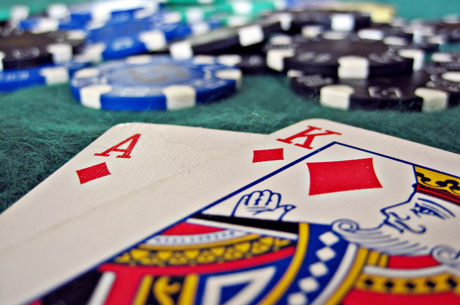Stud Poker Strategy: Variations for Spread Limit Games

Most of the strategy that I suggest in these columns is applicable to the moderately tight $5/10 and $10/20 games. It also works well for lower stakes games for the most part - when the players are similarly loose and passive. It makes sense to play relatively strict starting hands when the opposition will, for the most part, call you down with weaker hands.
However, many of the lower limit games are spread-limit games, not fixed limit games. These are games that have a betting structure that allows players to bet between $1 and $5 (sometimes $1 and $3 or $1 and $4) at any time. These games are different from the fixed limit games. They attract, generally, a different type of player. And their structure too makes them different. Let me address the changes in strategy that I recommend for them.
In general, these games tend to be even looser and more passive than the typical $5/10 game. In these spread-limit games, with a $.50 ante, it is often common for all or nearly all players to call the initial $1.00 bring in bet. So, for example, there might be six or seven players seeing Fourth Street for $1.00.
In games like this you can afford to be at least a little looser with your starting hands. For example, you can generally call the bring-in with hands such as gapped 3-Straights like 4-5-7 or 9-J-T. You can play with an Ace or a King in the hole if they're two suited and live. You can play low pairs even without high kickers, provided they're live. And you can play just three big cards, even if they're not suited.
This is because your implied odds are very large. For only $1.00 you have a chance at making a lot of money if you hit the perfect card (like making trips with a low pair) on Fourth Street. So you can give yourself permission to play more loosely than you normally would.
Similarly, on Fourth Street, if your cards are live, you can call a bet with an unimproved 3-Flush provided you don't anyone is drawing to a larger Flush. This is because, typically, you'll be against many opponents, so the eventual size of the pot you expect to win will be very large. Though you are drawing relatively thin - at least when compared to drawing to a 4-Flush on fourth - the odds that you'll make your Flush are still good enough to warrant staying for a single bet until Fifth Street - again provided your cards are still very live.
Other hands become less valuable, however, and you must change your betting habits accordingly. A pair of Jacks or Queens, without an Ace or King kicker, is often not worth betting on Fourth Street if it doesn't improve. And it may well be better to toss it if you think you're against a bunch of drawing hands and there is a bet and a raise. It surely doesn't pay to play further if one of your pair dies in front of another player and if your kickers go dead on Fourth or Fifth Street.
This is because large pairs are less likely to end up winning when there are four or five or more drawing hands against them. Straights and Flushes are much more likely, the more players who are drawing for them. So if your efforts to thin the field on Third Street failed -as they often do in these low limit spread limit affairs - then the better course of action may be to get out yourself.
On the other hand, there are some strategies that you may want to employ to help further limit the field on Fourth with your Premium Pair. If, for example, you think that someone else will bet after you check, you might try for a check raise, even if your hand might not be strong enough for that in a higher staked, tighter game. With your Jacks and an Ace kicker on Fourth Street, for example, you might want to check, hope someone else bets, so you can raise, making it two bets for players to call along to Fifth Street. You can also try this move on Fifth Street.
You must be concerned about two considerations however. You want to make sure that your raise will in fact make it two cold bets for others to call. If, for example, the likely bettor is to your immediately left then a check raise would be the exactly wrong move for you. Since his bet will likely be called and your raise will only make it a single bet more for the players who have already entered the pot. In that situation you should bet and hope for a raise, making it two bets for the other players. If, however, the likely better is to your right, then the check raise will produce the desired effect.
One other suggestion for varying your play in spread-limit occurs when you have Aces or Kings and the game is relatively tight. In those instances, if you are concerned that by raising the full amount you may knock out all of your opponents, you may want to raise by only $3.00 or so, hoping to induce one caller with your bargain price. You see, in a fixed limit game, your only option is to raise the full amount. In that case it surely makes sense to do so, willingly running the risk of knocking everyone else out to prevent the possibility of having many callers. But in spread limit you have the option of betting less. So you want to try to pinpoint that amount that will more readily get one caller rather than many - when you are especially strong with a pair of Aces or Kings (if no Aces are exposed elsewhere).
In most other respects, however, spread-limit plays like low fixed limit games. You must keep your eye on the size of the pot, however, and make sure that you are taking advantage of your occasionally larger pot odds when deciding whether to draw or fold on Sixth Street. Because some of these spread limit games have so many callers, it is often correct, for example, to draw to your two pair on Sixth Street even if you are certain that you are against one or two Flushes or Straights. They can't improve but you, with the chance for a full house, have about a 12:1 chance of improving to a hand they won't be able to beat. In a tight limit game, this usually doesn't make sense. But in these loose spread-limit stud games it is often profitable and should be attempted - even though you will lose most of the times you make the attempt.
Ed Note: If you are interested in Stud, check the Stud action at Royal Vegas Poker








